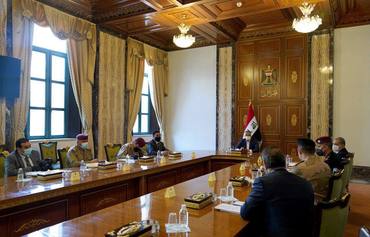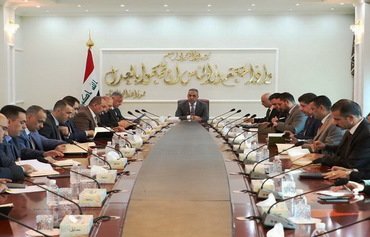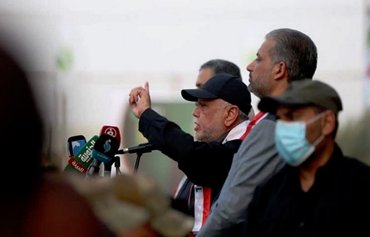The Iraqi government began in September to implement arrest warrants and summons orders against officials wanted for investigation on corruption charges.
Prime Minister Mustafa Kadhemi on August 30th announced the formation of a higher governmental committee to investigate cases of corruption and major crimes.
The committee, which has been granted exceptional powers, is chaired by Lt. Gen. Ahmed Taha Hashem, previously a senior official at the Ministry of Interior.
It includes representatives from the intelligence and national security agencies and Iraq's anti-corruption integrity commission.
Kadhemi has directed the Counter-Terrorism Service (CTS) to implement the decisions issued by the judges and the courts concerned with cases related to the work of the new committee.
Arrest warrants have so far been issued for at least 10 former and current government employees. These include officials in ministries and heads of government agencies, companies and banks.
Government pledges to fight corruption
Iraqi MP Sabah al-Akili, who serves on the parliamentary integrity committee, said the government employees represent the "third tier" in the list of individuals involved in corruption in Iraq.
Though the probe has not yet targeted top officials, "this is an unprecedented measure that was not taken at the level we see today by previous governments", he told Diyaruna.
"We hope these orders will continue to hold all persons convicted of corruption accountable," he said, adding that the judiciary will have the final word in their cases.
Prosecuting corrupt individuals is a public demand that Kadhemi's government has pledged to fulfill, al-Akili said.
"Iraqi MPs support any move in this direction, especially since corruption cases number in the thousands and are registered at the Bureau of Financial Supervision and the Integrity and Public Prosecution Authority," he said.
Some of these cases "have been in a backlog for many years and others were closed without due process and no results", al-Akili said.
"We hope that serious steps will be taken and those involved in the theft and squandering of public money will be imprisoned," he added, calling for the establishment of a specialised court to handle corruption cases.
This would help to expedite their settlement, he said.
Investigation gets under way quietly
The investigation committee has not officially revealed the names of those who have been summoned, legal expert Ali al-Tamimi told Diyaruna.
Nor has there been a progress update regarding investigation procedures, he added, pointing out that investigations into such cases should remain closed to the public until final judgments are issued by the judiciary.
In general, these actions have involved travel bans, prosecution and enforcement steps taken against officials accused of corruption, al-Tamimi said.
Going after lower level officials accused of corruption is a starting point in preparation for going after more senior figures, popularly known as "corruption whales", he said.
The committee is not only working on crimes related to financial and administrative corruption, he said, but also is investigating those suspected of committing exceptional crimes.
These include collusion with the "Islamic State of Iraq and Syria" (ISIS) and charges related to the use of excessive force against demonstrators, he said.
The government's initiative has garnered public support, al-Tamimi said.
The religious authority in Najaf also has endorsed it, calling on the government to open corruption probes and "continue to move firmly and forcefully along the path it has taken to implement social justice and impose the state's prestige".
Helping Iraq rebuild international trust
The initiative will help Iraq build trust with the international community and attract support in the areas of reconstruction, development and investment, economist Saleh al-Hammash told Diyaruna.
This is important, he said, as the international community has expressed concern that grants and loans it provides to Iraq to help rebuild its infrastructure and advance its economy may fall into corrupt hands.
These concerns were highlighted at the 2018 donors' conference in Kuwait.
A government initiative to prosecute and punish corrupt individuals will send a reassuring message to donor countries and investors that there is serious, on-the-ground effort to rid Iraq of corruption, al-Hammash said.
Corruption has gotten out of hand and become a major threat to the future and strength of the state, he said, adding that overcoming it will not be easy.
This will present a major challenge and test before the government, he said, but the government is embarking on a serious effort that must be given public momentum in order for it to be sustainable and successful.

![Iraqi Prime Minister Mustafa Kadhemi meets with members of his governmental team to discuss ways to tackle corruption on July 13th. [Photo courtesy of Iraqi government]](/cnmi_di/images/2020/10/09/26338-kazimi-iraq-meeting-600_384.jpg)







The government must strike strongly against the oppressors and corrupt so we can prosper again and keep up with the global convoy.
Reply3 Comment(s)
We hope the laudable efforts to combat corruption will be a success. Such success will help us proceed with construction and realisation of hopes. In this case, the wounds of the injured will be healed and the tears of joy will flow. Sadness has eaten away the mothers’ joy. Death awaits those who can’t afford the cost of treatment. Announcing it spreads a positive atmosphere. In order to realise it, we need to give lectures at government departments and not suffice with sending letters. Employees have had their brains washed since the cancellation of the name of the faculty of rights and its replacement with the faculty of law (before 2003.) This was a path to corruption and a failure to acknowledge, rather than give, rights. As payment isn’t possible, employees resort to deception, restricting acknowledgement thereof and not paying them. The Prime Minister needs to avoid restricting the salaries, which don’t meet the pay scale in the first place. He shouldn’t propose that to the parliament because they’re sponsors of legislation on the protection of corruption. The appearance of sincere voices in parliament isn’t important because this beautifies the image of the corrupt and looks as if it’s coming up with a solution. This is just a deceiving media and nothing more.
Reply3 Comment(s)
Hope they can soon arrest the heads of gangs that are competing against the national government which represents the people. They have robbed and killed, gone out and been affected by corruption.
Reply3 Comment(s)